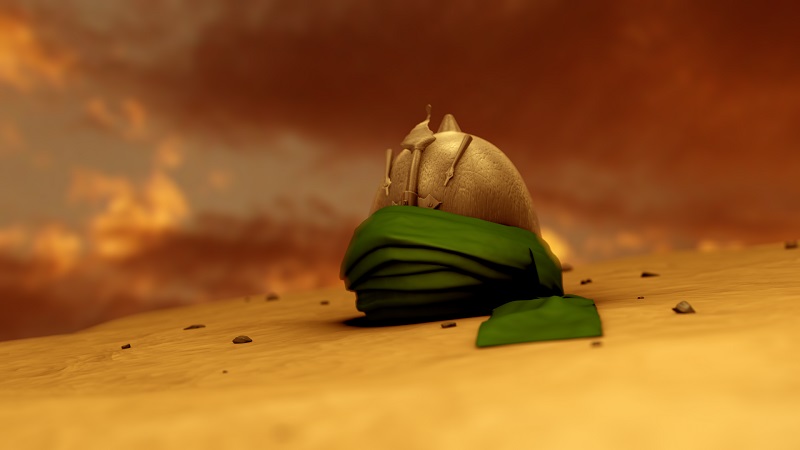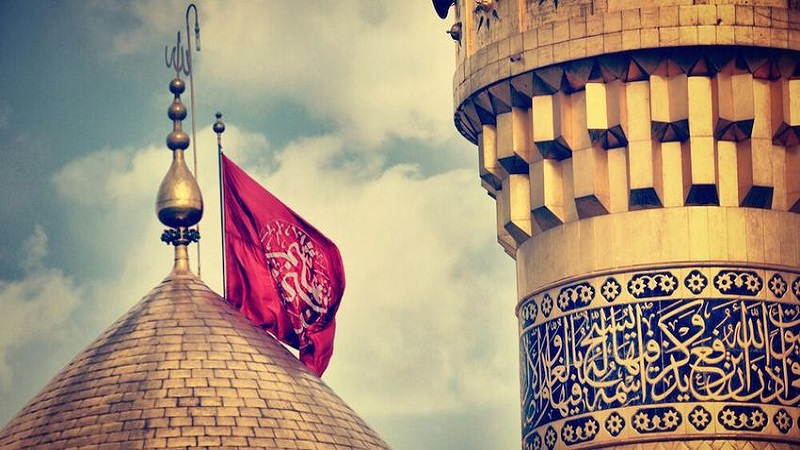

Five lessons we learn from Imam Hussain (AS)’s Revolution
The Day of Ashura is the 10th day of Muharram in the Islamic calendar, which marks the martyrdom of Imam Hussain (AS), the holy Prophet’s (PBUH&HP) grandson, and his companions in the battle of Karbala. They were all slain in such a horrific way that it is difficult to find such cruelty alike in the history of humankind. They were violently martyred after they were besieged and prevented from obtaining water to drink, and so they departed this life thirsty- this was for no crime other than their refusal to swear allegiance to Yazid, the notorious tyrant of the time [1].
Imam Hussain (AS), along with his family members and companions, showed the highest degree of moral standards in dealing with calamities they went through. He made any effort to clarify the truth and goals for which they rose up and were ready to sacrifice their lives. This article focuses on some of the most prominent virtues Imam Hussain (AS) and his companions displayed on this day; the ones that –if practiced- will finally lead to the salvation of humankind:
1. Imam Hussain (AS)'s Sacrifice for the Sake of the Religion of Allah
Imam Hussain (AS) taught the faithful believers, in practice, that they should not hesitate to sacrifice everything for the religion of Allah to protect it when it is at risk. He rose up against Yazid when he noticed this dictator openly violated the commandments of Allah.
He announced: “Don't you see that truth has been replaced by falsehood? We must be prepared to sacrifice everything precious in support of Truth!”. Ali Akbar (AS), Imam’s eldest son, asked him in this regard if they were on the right path. Imam (AS) replied in the affirmative. Ali Akbar (AS) then said: “Then, it makes no difference if death comes to us or if we approach death.”

2. Live the Life of a Freeman
Imam Hussain (AS) believed that living under a tyranny was nothing but living in hell:
“To me, death is nothing but happiness and living under tyrants nothing but living in a hell” [2].
In Karbala, when Imam Hussain (AS) was placed in a dilemma by the oppressors to be humiliated by swearing allegiance to Yazid or to fight and die with glory, he said he would not accept humiliation and obedience to mean people [3].
In another famous narration, he said: “If you don't believe in any religion and don't fear the Resurrection Day, at least be free in this world” [4]. In other words, if you do not follow a specific religion or believe in the Hereafter, at least be humane in your worldly affairs. This saying of Imam (AS) invites the whole world to reject submission to oppression; to practice freedom.
3. Significance of the Enjoining the Right (Amr bi-l-maʿruf) and Forbidding the Wrong (Nahy ʿani-l-munkar) for Imam Hussain (AS)
The most important social message of Imam Hussain (AS)’s revolution is fighting against people’s unawareness. The tyrants of that time had done everything to diminish the limits between right and wrong, and Imam Hussain (AS) intended to redefine that for the society:
“I never revolted in vain, as a rebel or as a tyrant, but I rose seeking reformation for the nation of my grandfather Muhammad (PBUH&HP). I intend to enjoin good and forbid evil, to act according to the traditions of my grandfather, and my father Ali ibn Abi-Talib (AS)” [5].
4. Imam Hussain (AS)'s Patience
Imam Hussain (AS) and his loyal companions were all patient in the face of traumatic events, among which are: being surrounded in the hot desert and prevented from obtaining water for three consecutive days by the enemy, martyrdom of his six-month-old infant son, his young son, Ali Akbar (AS), his brother Abbas ibn Ali (AS), his relatives and companions before his eyes, etc.
Imam (AS) never complained about these and instead would say: “We, the household of the Prophet (PBUH&HP), are subservient to whatever Allah has destined us. We will be patient on this calamity, which has happened to us. Of course, Allah the Almighty will give us the reward of the patients. We will be surrounding the Prophet (PBUH&HP) in the Paradise” [6].
On the day of Ashura, when the battle was in full swing, he told his companions: “Be patient O ' the son of the nobles. Death is only a bridge that takes you from misery and loss to the vast Paradise and the eternal graces” [7].
Imam Hussain (AS) and his blessed companions were living examples of what the Quran taught: “So be patient, with a patience that is graceful” (70:5); patience which was not out of helplessness or weakness but was a demonstration of steadfastness and bravery.

5. Imam Hussain (AS)'s Loyalty
Fidelity and promise-keeping was the other prominent feature of Imam Hussain (AS) and his companions. See how Imam (AS) described his companions on the night before Ashura: “I do not know companions more loyal and better than my companions” [8]. That night when Imam (AS) told them they were free to leave and give up before the battle, his brother, Abal-Fazl al-Abbas (AS), said: “Why should we do such an act? To live after you, never! May Allah forbid such a day!” The others, too, unanimously said they would never betray their Imam.
Or, in another example we see, on the day of Ashura, after Abbas (AS)’s right hand was cut off by the army of Yazid –when he had gone to get some water for the children and women- he bravely recited these epic verses: “By Allah, if you cut my right hand, I will never stand back, and I will protect my religion, and I will support the Imam who stands firm in his belief and is the grandson of the pure and truthful Prophet [9]”.
These were only a few examples of what made Ashura and Imam Hussain (AS)’s uprising an epic that will never fade from the memory of humankind. Every year, millions of people around the world commemorate this tragedy, express their sorrow, and remind themselves to firmly stand against tyranny as Imam Hussain (AS) did. This has also affected the people of other faiths, as Mahatma Gandhi has said:
“I learned from Hussain (AS) how to be wronged and be a winner, I learned from Hussain (AS) how to attain victory while being oppressed [10]”.
References
- Imam Hussain (AS)
- Tohaf-al- Uqoul, P. 245
- Biharol Anwar, Vol. 45 , P. 83
- Biharol Anwar, Vol. 45, P. 51
- Biharol Anwar, Vol. 44, P. 329
- Biharol Anwar, Vol. 44 , P. 366
- Biharol Anwar, Vol. 44 , P. 297
- Biharol Anwar, Vol. 44, P. 392
- Hussain
- how to be wronged
- magazine
- Imam Hussain revolution
Share This Article

Will Everyone (eventually) Go to Heaven in Islam?
For those who believe in the afterlife, there is often this concern that whether they go to heaven or hell. Some Muslims believe that being a Muslim suffices for entering heaven, but is that true? If so, what happens to those who are born to non-Muslim families? Some believe that all Muslims are Arab or to become Muslim one should be whether Arab or know Arabic. Then, they might ask about what will happen to those who do not know Arabic. Since no one chooses where to be born, is it fair to send those born among disbelievers (Kafir) to hell? What will happen to converts because of their past before conversion to Islam? These and other questions are all answered here.
Heaven or hell? It is up to you!
Some people believe that God has created mankind to send some of them to heaven and the rest to hell! But, it is not true at all. One is totally free to follow the divine guidance and reach heaven or to deny it and go to hell. Hence, everyone determines him\herself where he\she goes after death.
According to the Quran, God will curse those who are disbelievers and die while they are still disbeliever (2:161). They will remain in hell forever, their punishment will not be alleviated, nor will they be reprieved (2:162). On the contrary, those who are faithful to God and do righteous deeds (98:7) will be rewarded the Gardens of Eden. God will be pleased with them, and they will be pleased with Him (98:8).
Knowing that not having faith will end in hell, what will happen to believers? Will they all enter heaven?
What will happen to the followers of the previous monotheistic faiths?
Islam recognizes the freedom and other rights of the followers of the previous religions; also, has ordered Muslims to hold them in considerable respect [1]. Moreover, Islam knows those followers eligible for salvation; it all depends on one’s deeds and faith in God. In Surah al-Baqarah it is said that: “Indeed, the faithful, the Jews, the Christians, and the Sabaeans—those of them who have faith in Allah and the Last Day and act righteously—they shall have their reward from their Lord, and they will have no fear, nor will they grieve” (2:62). In other words, according to the Islamic principles, it is disagreeable to punish those who have not received the message of Islam either before its rise or after that, and God will never do that.
Are all Muslims allowed to enter heaven?
In Surah Al-i-Imran it is said that anyone who follows a religion other than Islam will be among the losers in the Hereafter (3:85). So, being a Muslim, on its own, is the prerequisite for entering heaven; but it is not enough. The key to the eternal salvation and heaven is doing good deeds. Whoever submits to Islam but does not do any good deeds will not go to heaven. On the contrary, there are people who are not Muslim, as we call it, but they will accept Islam if they receive its message and therefore, they might enter heaven. In other words, one should have faith and submit to God, and this should be manifested in one’s acts.
In Surah al-Hujurat, the difference between belief and submission is clarified (49:14). By saying the two testimonies (Shahada), one submits to Islam, but being faithful is more than that. To have faith in God deep in the heart, one should obey God and his messenger, Prophet Muhammad (PBUH&HP) (49:14), and this should be reflected in one’s conduct [2].
It is also stated that the noblest of people before God is the most righteous of them (2:13). This is logical, too. We also, as human beings, naturally like and appreciate those who are good and do good deeds. Hence, what is important is one’s deeds. Skin color, race, language, nationality, gender, age, and social class do not solely lead to salvation and heaven. Two clear examples in this regard are the son of Prophet Noah (PBUH) and the wife of Prophet Lot (PBUH) who both did not believe in prophet’s message and were thus condemned to Hell. Their stories warn that in spite of being a member of the family of the prophet, one might deviate, disobey God and move towards hell.
How about disbelievers?
Among disbelievers (Kafir), there are those who deny the truth and will never submit to the divine guidance. These will never enter heaven, as mentioned earlier. There are also non-Muslims who have not received the message of Islam, and they are not responsible for not receiving it, but they will surely accept Islam as soon as they know about it. These will not be punished and will not go to hell since the Quran says: “We do not punish (any community) until We have sent (to them) an apostle” (17:15).
References:
- Monotheistic faith
- M. H. Tabataba'I, “Tafsir al-mizan”, (2 :14).
Read More

The Importance of Lawful Earning in Islam: Part 1
Have you ever thought about the concept of earning in Islam? Or what role wealth plays in our lives and why we really need to earn money? To some people, money could be a result of the exchange of value. In other words, what you are doing is of value to someone, and that is why you are paid for it.
You might get excited to know the value you are delivering to people is making their lives better; then you will be probably more motivated to enhance your get-rich potential and try to make more and more money! This would be an ideal reason for someone to earn money. However, we all need money to spend for certain reasons, e.g., food, clothing, shelter, etc.
What Does Earning in Islam Suggest?
Muslims believe wealth is one of the innumerous blessings of Allah that is referred to as ‘Khair’ -meaning goodness- in some verses of the Holy Quran (2:215, 2:180). In another verse, it is mentioned as an attraction of this worldly life (18:46). What’s more, gaining wealth has been given so much importance in the religion of Islam that Prophet Muhammad (PBUH&HP) says: “Seeking lawful earnings is compulsory for every Muslim” [1].
Islam also seriously recommends attaining the sustenance provided by God through hard work and striving. It is stated in the Islamic narrations that Allah does not like a person who prays for income while he has quit earning and does not try for it [2]. The holy Quran also says:
“That nothing belongs to man except what he strives for, and that he will soon be shown his endeavor, then he will be rewarded for it with the fullest reward” (53:39-41).
How Should We Earn Money?
Along with the importance Islam attaches to gaining wealth through hard work, it places greater emphasis on making money through lawful (Halal) ways.
“Eat of what is lawful and pure in the earth, and do not follow in Satan’s steps” (2:168).
Based on this verse, consuming only what is lawful (Halal) and good, and abstaining from unlawful (Haram) things, are among the basic principles of the Islamic lifestyle. Many Islamic narrations advise and praise the acquisition of livelihood through fair means, i.e., NOT through stealing, cheating, betting, etc. Islam actually underscores the importance of productive enterprises that can increase output and generate jobs; this is the reason why earning money through gambling is Haram in this religion.
Some Features of a Lawful Income in a Prophetic Tradition:
According to Prophet Muhammad (PBUH&HP) in order for an income (in trading) to be Halal, one should not
fault the product he/she is buying,
praise the product he/she is selling,
deceive anyone
swear to God while trading [3].
The Benefits of Lawful Earning in Islam
“Whoever lives on Halal earnings for forty days, God shall enlighten his heart” [4]. Some benefits of earning income through fair means are:
Receiving the Protection of God
Allah says: “If what you eat is Halal and pure, I will protect you” [5].
Acceptance of Prayer
Prophet Muhammad (PBUH&HP) says if you want your prayer to be accepted and fulfilled by Allah, make sure your income is Halal and pure [6].
Receiving God’s Glory and Honor on the Day of Judgment [7]
Strengthening One’s Faith [i]
Getting Allah’s Blessings and Favors (Barakah):
Your income sometimes may not seem enough, but if it is gained through Halal ways, it will be blessed by Allah; so it will suffice: “And whoever puts his trust in Allah, He will suffice him” (65:3)
The Adverse Effects of Unlawful Earning in Islam
“You see many of them actively engaged in sin and aggression, and consuming illicit gains. Surely, evil is what they have been doing” (5:62).
Here are a few negative effects that await people who choose the wrong way of earning money (by foul means) either for their greed or deprivation:
Their Halal income will be reduced, and they will be deprived of Allah’s blessings (Barakah) [8]
Their prayers will not be answered [9].
They will become hard-hearted and cruel [9].
Consumption of Haram will have negative effects on their offspring and descendants [9].
Our sustenance lies with Allah
Finally, we should always remember that God is the All-provider (51:58) who has ordained Halal sustenance for all creatures, and the creatures’ efforts to earn their living is placed alongside His will. So, we will definitely reach what is provided for us by Him if we try more patiently, and if we are content with and thankful for what we already have.
God has not forgotten any of us; the Holy Quran says: “There is no animal on the earth, but that its sustenance lies with Allah, and He knows its [enduring] abode and its temporary place of lodging. Everything is in a manifest Book” (11:6) Then we had better avoid what Allah has told us is unlawful (Haram) since:
“Yet it may be that you dislike something, which is good for you, and it may be that you love something, which is bad for you, and Allah knows, and you do not know” (2:216).
Notes:
[i] “Never give up striving for lawful livelihood as it reinforces your faith”. Imam Sadiq (AS) [10]
References:
- Bihar al-Anvar, vol. 103, p. 9
- Ayatollah Javadi Amoli, Mafatih al-Hayat, p. 582
- Ibid p.589
- Bihar al-Anvar, vol. 53, p. 326
- Ayatollah Javadi Amoli, Mafatih al-Hayat, p.589
- al- Daawat, p. 24
- Kanz al-Ummal, vol. 14, p. 249
- Ayatollah Javadi Amoli, Mafatih al-Hayat, p. 593
- earning in Islam
- Bihar al-Anvar, vol. 71, p.128
Read More

